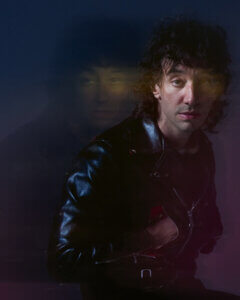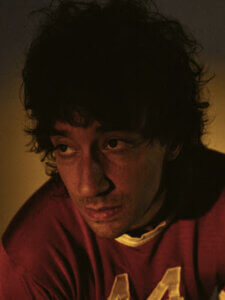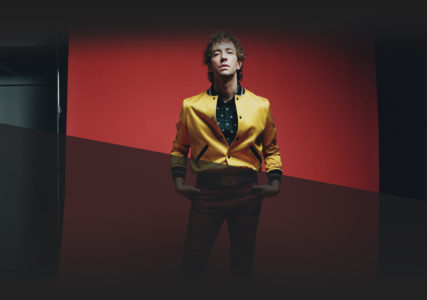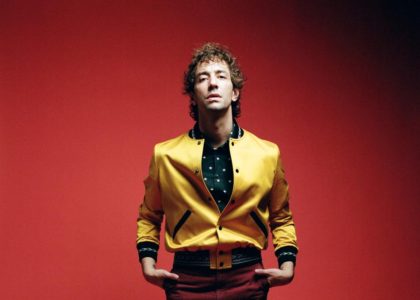Our Interview with Albert Hammond Jr.
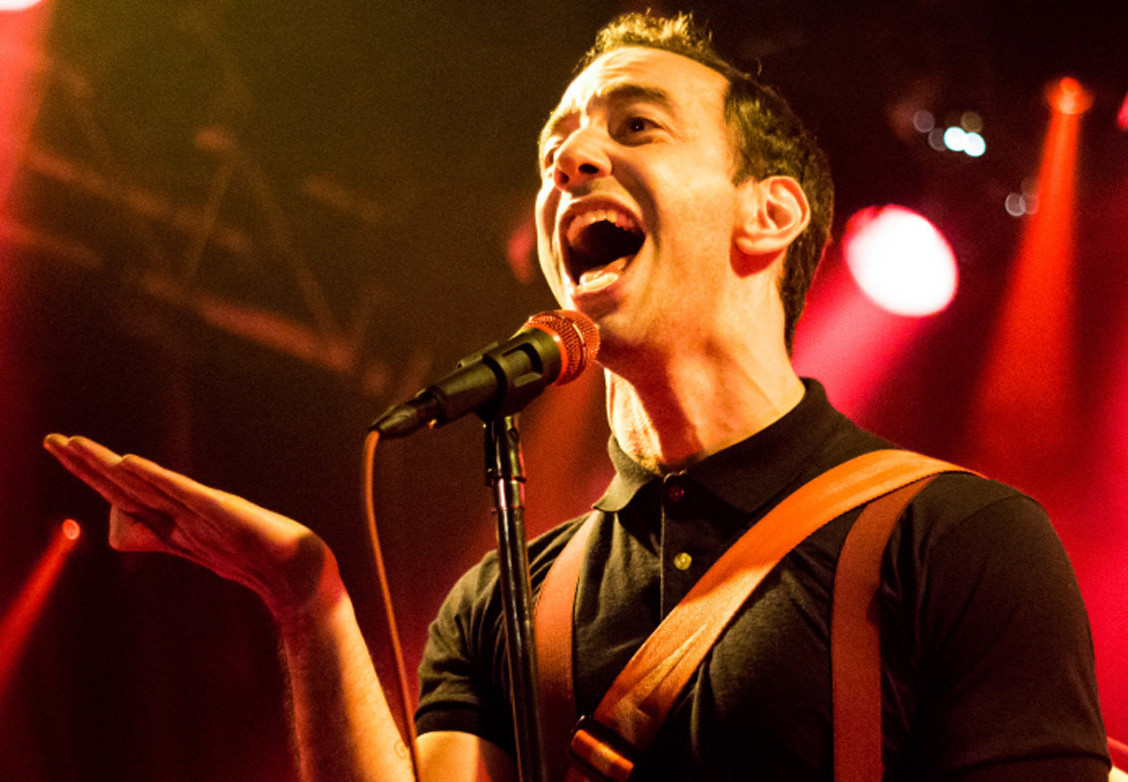
Albert Hammond Jr. has just dropped his third solo album, Momentary Masters, through Vagrant Records. Originally making his name as guitarist for The Strokes, this new record goes a long way to further establishing him as a singer and songwriter in his own right, along with being an accomplished guitar player. We caught up with Albert to chat about the LP and his upcoming North American and European tours.
NT: Thanks for taking the time to speak with Northern Transmissions Albert, how are you? Where are you right now?
AHJ: Hey how you doing! I’m at my house upstate New York, I’m at home.
NT: A little downtime before the tour kicks off?
AHJ: Yeah I guess, we start rehearsal on Monday. So a little downtime-slash-presstime and then the whole rehearsal thing.
NT: I wanted to start by talking about your new record Momentary Masters. Congratulations, man. It is a really cool record.
AHJ: Thank you!
NT: The album was recorded at your home studio in upstate New York as opposed to a big studio. Do you think this lent itself to a more relaxed and fun creative atmosphere?
AHJ: I think it’s usually pretty relaxed and fun anywhere. I think the biggest thing, is that because I couldn’t do it in one chunk, it leaves everything sitting where it is, so you know you could record for a week and come back a month and a half later and everything would still be there so you don’t need to take those days to set up or take down.
NT: I guess it also affords you the opportunity to take breaks and go back with fresh ears to listen back objectively to what you have put down.
AHJ: Sure, I mean it’s fun to be at home but I like variety and I feel like this feels pretty new, I’ve only done things in studios so this is exciting but I kind of would love to be able to do one in some big house in the country of like France or Germany and like bring in a whole mobile unit and have everyone live there. I really enjoyed having everyone in the one place and being able to do music for good periods of time.
NT: In the spirit of Exile on Main Street!
AHJ: Yeah…, yeah except that seemed like a bit of a chaotic mess! It sounds romantic though…but maybe…I don’t know if I’d like to do that. But yeah I like the idea of everyone being there and you can play music for a little bit and then stop and go do something else, that’s really cool.
NT: So it doesn’t feel so regimented and you’re not watching the clock the whole time.
AHJ: Yeah exactly.
NT: How much do you feel the album evolved from the early demoing process? How primitive is your demoing process in comparison to album sessions?
AHJ: I mean yeah demos are always ideas, I wouldn’t call them demos but in the beginning ideas are always on a Dictaphone and different parts and then like you kinda put them in folders on your computer. I’ve made elaborate demos, like the first couple of songs I thought we were gonna do were pretty elaborate, the demos, and then we started to arrange those in the studio and like new things were coming about so I was like ‘fuck it, instead of doing demos I’ll just come and bring the rawest of my ideas and see if it works.’
NT: Straight from the moment of inspiration to tape where you can really catch the spirit of the track, where you can maintain the excitement rather than methodically trying to recreate something you’ve already recorded.
AHJ: Yeah I mean it was just kind of- the songs were there and I knew them in my head or just knew things I liked, or what I thought I wanted, and so instead of spending the time myself I just spent it with other people…and Gus (Oberg – producer) tried to figure out arrangements, so it was definitely really exciting and it took a little bit to learn but once we got a handle on how we were doing things it was really exciting.
NT: At this point it would seem you have put a lot of trust in your band to get into the spirit of the song the way you have envisioned it?
AHJ: Well, that was the whole excitement of wanting to record is I was curious about how we would play things together you know, so that was part of the excitement to even start a record, it was like ‘awh I love playing with these guys while we’re on tour I wonder what it would be like to play these songs’…but there was a slow growth towards that, and I mean I believe in my ability…of, like, hearing something that I wanna hear, so yeah I trust them but I feel like I trust myself so I’m not that worried. In the end it’s music and we were just having fun all together, it was just cool to be there in a room with all of us being excited about the same thing. That happened with so many songs, it was a lot of fun.
NT: I recall an interview at the time of the AHJ EP release in which you said you had grown tired of the album format. What inspired you to get into the studio to record another full-length?
AHJ: It’s true I said that, but the thing is it’s the format that you have to use to kind of like, do things. So I felt like I had to make a record, it (the EP) wasn’t big enough to change things.
NT: Like the album may be the most universally recognized or even valid format?
AJH: Yeah you just don’t get enough press or festival offers, so like to really do something like that you have to be a really huge band who’s just going to commit to like a two-year cycle of releasing an EP every six months while being on the road too. And then maybe it could work and people will cover you cos you’re doing this whole big event, but for me it was a bit of a let-down because I felt like those songs were really good and they were kind of like gone unheard because of it.
NT: Totally. There is quite a distinct difference in style and texture between the first two records Yours to Keep and Como te Llama’ and the AJH EP and Momentary Masters. To what do you attribute to this change in sound?
AHJ: It’s a mixture of stuff, a record captures the different moments in time and for my first record I wasn’t even thinking of making a record. I was just trying to leave my apartment so I could actually finish demos and I met this guy (Greg Lattimer – producer) and he helped me complete a few songs. Then I met Gus and we finished a few more. So it was like this process of like, ‘I need to finish these songs so that I can grow’, and so that was kinda like that process of that one. Then the second one was coming off of playing all these shows and it was like at the height of being fucked-up but there was some great songs. Gus and I spent so long demoing stuff, but there was not that much focus on certain things, or we’d spend all this time on this one thing and then when you go in the studio re-spend time my mind is in a different place, but it was fun to do. Then the EP started slowly again with Gus at home and just every day kinda got this new excitement and these new songs that I feel like I hadn’t formed before. So that then gave me the confidence to tour. Then the new band gave me the confidence to put out this one, and this one then became something bigger than all of those combined.
NT: You have established a great working relationship with Gus, that is a connection you have maintained since you guys worked on Yours to Keep in 2006. What is it about the relationship between you guys that works so well in the studio?
AHJ: Well he’s not a ‘yes’ guy, so I feel like that’s probably the biggest thing. We still talk about stuff and disagree and think about things the same as we always have so I feel like that’s what keeps things fresh as we’re constantly pushing each other, he has strong ideas and I have strong ideas so it’s like sometimes there is something you wouldn’t do but you believe in where they’re going and you kind of let go and it goes both ways. I started to believe that you really have to pick people around that you trust so that you can put more focus in the stuff you do, because if you try to do everything you can water everything down. So I feel like the people around me, I’ve just let them do their thing, and that happened with the mixer too… we met this guy, Ben Baptie, and he was just amazing and changed the record in such an amazing way but it was the first time I’ve really let go and I wasn’t even there and I let him do his thing.
NT: Yeah I did hear that when you got the mixes back you had no changes to make, that must have been unreal!
AHJ: Totally! Yeah we did like 2 of the most minor changes but he really got it, he heard it, and just got it, and every time we got it back the changes would always just be like a subtle volume thing but when you’re mixing that’s super easy. If anything he created a dynamic vibe in it by how he mixed it and it was all there. It was the first time I ever met a mixer who took an album that I thought was all there and then took it up a notch.
NT: The album title, Momentary Masters, is a reference to a Carl Sagan quote from his book Pale Blue Dot in reference to our relationship with Planet Earth. What was it about this batch of songs that made you want to connect them to this quote?
AHJ: It was a gut reaction, I had a few hours left to pick a title and I just wasn’t sure with what I had and then I used the Youtube clip on meditation and when I heard the words, it just sounded like it would age with the album well, like it would just create a cool feeling with the record so I just went with it.
NT: This summer you performed shows at Lollapalooza and Primavera. How do you think the new material has gone down with the festival audiences?
AHJ: I feel like it’s going down great. I mean both those shows, well maybe not Lollapalooza…but the album hadn’t come out yet, or like the album had been out for maybe a day at Lollapalooza. I feel like I’m excited to go on this tour now and kind of see where the crowd goes by next year because I feel like the same thing happened with the EP, you go out, no-one really knows it, and then a few months into touring the EP you play one of the songs and everyone’s so excited. I remember when we played St. Justice and no-one noticed, and now I play St. Justice and everyone yells for it so I just find it very funny to see that change.
NT: I guess that’s the buzz of playing live music.
AHJ: Yeah basically, yeah.
NT: You’re set to tour North America and Europe this Fall kicking off in Pittsburg on September 9th. How do you expect the songs to play out live compared to the record? Do you expect them to evolve somewhat over the course of your time on road?
AHJ: Yeah I mean they’ll always change a little bit. There’s always little things in a record that you don’t come across live, like small nuancey parts, and so I feel like in all the songs there is a certain drive that’s in the record and when we play it live we really attack that, and I feel like all these songs so far have sounded amazing live. Even in the rehearsal space, they’re just a lot of fun.
NT: You are synonymous with the white stratocaster. How many white strats do you own?
AHJ: It’s not that I love white strats that is actually my main guitar and my only one. It’s the same one I’ve used since since I was 19 years old. The pickups are wired especially strong and so there’s just something, it just has a great tone to it, I can’t really explain it.
NT: Do you find that when you finish a record that your mind immediately jumps to the next one or do you like to get the touring taken care of before giving it any thought?
AHJ: Yeah it’s a constant thing, it’s like I’ll realize the record it done but I already have a folder that says AHJ 4 and I have songs that I’m really excited to play and I’ve got songs that I just can’t wait to sit with the band and play.
NT: What are 5 albums that are important to you at the moment?
AHJ: Pink Flag – Wire.
Buzzcocks – Greatest Hits.
The Misfits – Static Age.
Wipers – Is This Real?
R. Stevie Moore – Glad Music
NT: Thanks for your time Albert, I look forward to your show here in October.
AHJ: Thanks man see you soon, take care!
Interview by Stephen White
Latest Reviews
Tracks
Advertisement
Looking for something new to listen to?
Sign up to our all-new newsletter for top-notch reviews, news, videos and playlists.





